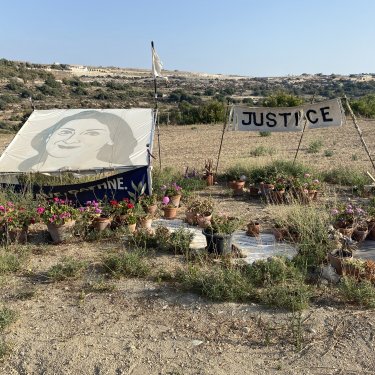Landmark public inquiry report finds Maltese state must “shoulder responsibility” for the assassination of Daphne Caruana Galizia

A newly published public inquiry report has found that the Maltese state must “shoulder responsibility” for the October 2017 assassination of journalist Daphne Caruana Galizia, having created an atmosphere of impunity, and failing to recognise the real and immediate risks to Caruana Galizia’s life and take measures to avoid that risk.
The detailed report totalled 437 pages in Maltese and was drafted by retired judge Michael Mallia, former chief justice Joseph Said Pullicino, and Madam Justice Abigail Lofaro, who comprise the board of inquiry. The board found that the Maltese state had failed to recognise the real and immediate risks to the life of Daphne Caruana Galizia and had failed to take reasonable measures to avoid that risk -- in other words, to prevent her assassination.
“While there is no proof that the State per se played a role in the assassination of Daphne Caruana Galizia, for reasons amply shown in the body of this report, the State has to shoulder responsibility for the assassination because it created an atmosphere of impunity, generated from the highest levels in the heart of the administration of the Office of the Prime Minister,” the report concluded.
“We welcome the publication of the public inquiry report, which on initial review appears reflective of the independent nature of the board of inquiry. We will continue to analyse the full report in the coming days and will work to hold the Maltese government accountable for addressing these extremely worrying failures, with a particular eye to ensuring concrete measures are implemented to actively protect journalists still working in Malta,” said RSF’s Director of International Campaigns, Rebecca Vincent.
For nearly two full years, RSF had engaged in extensive advocacy, alongside Caruana Galizia’s family and their legal team, as well as a coordinated group of international NGOs, to secure the establishment of the public inquiry. Former Maltese Prime Minister Joseph Muscat’s administration had strongly opposed the measure until the very end of a three-month window set as a deadline by the Parliamentary Assembly of the Council of Europe in a key resolution titled ‘Daphne Caruana Galizia’s assassination and the rule of law in Malta and beyond: ensuring that the whole truth emerges.’
RSF editor-in-chief Pauline Adès-Mével gave testimony to the public inquiry on 24 July 2020, describing worrying trends in Malta in the months leading up to Caruana Galizia’s assassination, and conveying RSF’s view that there were clear signs of the risks Caruana Galizia faced and that her assassination could have been prevented. RSF also supported a joint written submission to the public inquiry together with eight other NGOs.
As RSF Director of International Campaigns Rebecca Vincent told The Shift News earlier this week in Malta, the work of the public inquiry could serve as a model for how to respond to cases in other country contexts, noting it was vital to draw lessons from the findings in order to protect other journalists going forward.
In Malta this week, Vincent also monitored the 27 July sitting in the compilation of evidence that continues against accused assassination mastermind Yorgen Fenech, in which Daphne’s son Matthew Caruana Galizia gave testimony, describing what his mother had been investigating in the run-up to her murder, the pressure she felt, and the precautions they had both taken out of fear for their safety. “We were like a train on tracks heading towards the station and someone would have to blow it off the tracks to stop it,” he told the court.
“Although the public inquiry findings represent a crucial step towards justice for Daphne Caruana Galizia, it’s important to remember that it is a separate process from the criminal case. It remains extremely important to closely monitor the ongoing criminal proceedings and ensure that all those involved in every aspect of this heinous assassination are brought to full justice,” Vincent said.
Malta is ranked 81st out of 180 countries on RSF’s 2021 World Press Freedom Index, having fallen a staggering 34 places since Caruana Galizia’s assassination in 2017.



